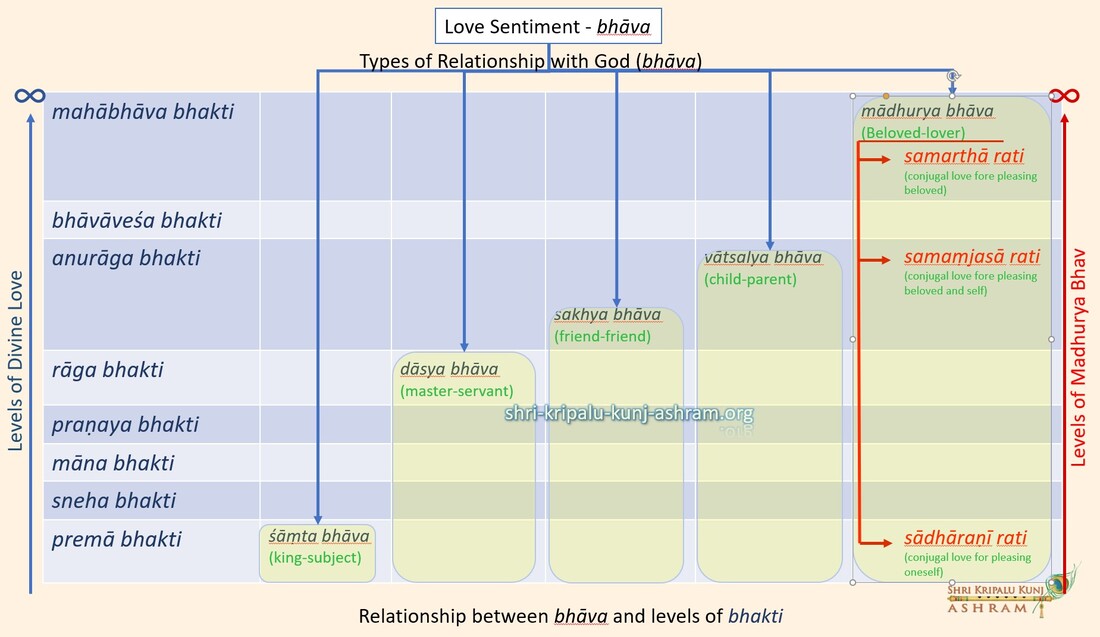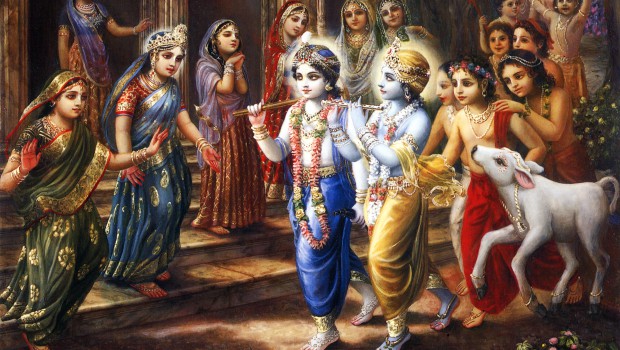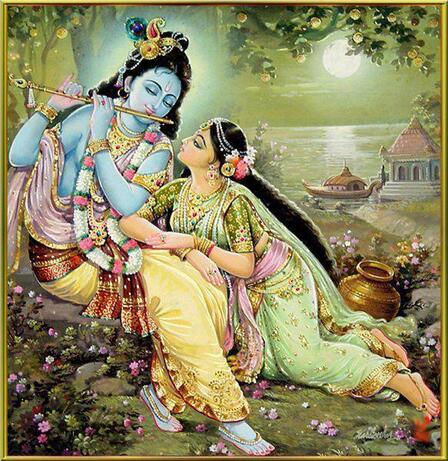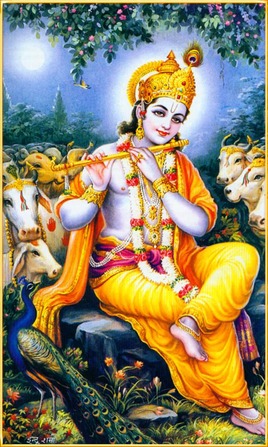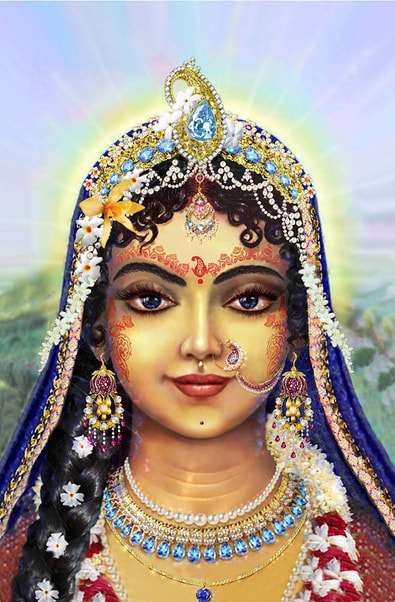God has an intimate divine power called Swaroop Shakti (स्वरूप शक्ति). As soon as the seeker starts sadhana bhakti, by the grace of Guru, Swaroop Shakti enters the seeker’s mind and starts cleansing it of all material desires. At the zenith of bhav bhakti, mind is cleansed of all material desires and yearning for meeting God is at its acme. It is at this crucial moment that Guru makes the seeker’s mind divine and bestows divine love. Immediately God appears in front of the devotee and removes Maya forever. This siddha bhakti or perfect devotion is a divine gift and is called Prema Bhakti (प्रेमा भक्ति).
The supreme God Shri Krishna is bliss. The essence of bliss is called Hladini Shakti (love-potency) which means “the giver of bliss”. Essence of Hladini is prem (divine love). This prem is a divine gift hence NOT a fruit of sadhana bhakti.
The supreme God Shri Krishna is bliss. The essence of bliss is called Hladini Shakti (love-potency) which means “the giver of bliss”. Essence of Hladini is prem (divine love). This prem is a divine gift hence NOT a fruit of sadhana bhakti.
Levels of Prema Bhakti
The divine love is unlimited and everlasting. Yet based on the sweetness and intimacy with Shri Krishna, it can be divided into eight levels.
The first stage of perfect love, which is attained only by the grace of Guru upon God realization. Two kinds of devotees attain this state: those who worship
1. Paramātmā form
2. Shri Krishna with sadharani rati
1. Paramātmā form
2. Shri Krishna with sadharani rati
The Sanskrit word sneh (स्नेह) means oil. In this state love attains excellence. The lover perceives the beloved all the time and this melts the lover’s heart.
When sneh is enkindled in the heart, the longing to meet Shyam Sundar does not subside.
When sneh is enkindled in the heart, the longing to meet Shyam Sundar does not subside.
आरूह्य परमां काष्ठां प्रेमा चिद्दिपदीपनः । हृदयं द्रावयन्नेष, स्नेह इत्यभिधीयते ।
ārūhya paramāṃ kāṣṭhāṃ premā ciddipadīpanaḥ । hṛdayaṃ drāvayanneṣa, sneha ityabhidhīyate ।
अत्रोदिते भवेज्जातु न तृप्तिर्दशनादिषु ॥ उ.नी.म. ७९
atrodite bhavejjātu na tṛptirdaśanādiṣu ॥ u.nī.ma. 79
हमारो सहज सनेही श्याम... प्रेम रस मदिरा (विरह माधुरी २०४)
hamāro sahaja sanehī śyāma... prema rasa madirā (viraha mādhurī 204)
अङ्गसङ्गे विलोके च श्रवणादौ स च कमात् । कनिष्ठो मध्यमो श्रेष्ठस्त्रिविधोऽयं मनोद्रवः । उ.नी.
aṅgasaṅge viloke ca śravaṇādau sa ca kamāt । kaniṣṭho madhyamo śreṣṭhastrividho'yaṃ manodravaḥ । u.nī.
ārūhya paramāṃ kāṣṭhāṃ premā ciddipadīpanaḥ । hṛdayaṃ drāvayanneṣa, sneha ityabhidhīyate ।
अत्रोदिते भवेज्जातु न तृप्तिर्दशनादिषु ॥ उ.नी.म. ७९
atrodite bhavejjātu na tṛptirdaśanādiṣu ॥ u.nī.ma. 79
हमारो सहज सनेही श्याम... प्रेम रस मदिरा (विरह माधुरी २०४)
hamāro sahaja sanehī śyāma... prema rasa madirā (viraha mādhurī 204)
अङ्गसङ्गे विलोके च श्रवणादौ स च कमात् । कनिष्ठो मध्यमो श्रेष्ठस्त्रिविधोऽयं मनोद्रवः । उ.नी.
aṅgasaṅge viloke ca śravaṇādau sa ca kamāt । kaniṣṭho madhyamo śreṣṭhastrividho'yaṃ manodravaḥ । u.nī.
जब चित्त श्याम सुन्दर के अङ्ग सङ्ग से द्रविभूत होता है तो इसे कनिष्ठ कहते हैं । जब दर्शन से हो है तो इसे मध्यम और जब श्रवण मात्र से ही उत्पन्न हो तो उसे श्रेष्ठ माना जाता है ।
When the heart melts with physical association of Shri Krishna then it is called kanistha (small) love, when it melts at His sight then is is called madhyam (medium) and when heart melts at merely hearing His voice then it is shrestha (superior) love.
When the heart melts with physical association of Shri Krishna then it is called kanistha (small) love, when it melts at His sight then is is called madhyam (medium) and when heart melts at merely hearing His voice then it is shrestha (superior) love.
स्नेह दो प्रकार का - घृत स्नेह, मधु स्नेह ॥
sneha do prakāra kā - ghṛta sneha, madhu sneha ॥
sneha do prakāra kā - ghṛta sneha, madhu sneha ॥
"sneh is of two types. Ghrit sneh and madhu sneh".
|
स घृतं मधुचेत्यक्तः स्नेहो द्वेधा स्वरूपतः ॥ आत्यन्तिकादरमयः स्नेहो घृतमितीर्यते ॥
sa ghṛtaṃ madhucetyaktaḥ sneho dvedhā svarūpataḥ ॥ ātyantikādaramayaḥ sneho ghṛtamitīryate ॥ Ghrit means ghee – purified butter. Ghee liquefies with warmth but solidifies in cold. Similarly, the heart of a lover with Ghrit Sneh needs care and attention from the beloved and in the absence of care and attention her heart hardens. Ghee tastes sweet only when it is mixed with sugar, otherwise not.
In Ghrit sneh the sentiment is “I belong to him”. |
As opposed to ghee, honey (madhu) is sweet by itself and temperature fluctuation doesn’t drastically impact its consistency. Madhu sneh is similar to honey. This love increases with or without any attention and association of the Beloved, therefore love never diminishes.
मदीयत्वादतिशयभाक् प्रिये स्नेहो भ्वेन्मधुः ।
madīyatvādatiśayabhāk priye sneho bhvenmadhuḥ ।
madīyatvādatiśayabhāk priye sneho bhvenmadhuḥ ।
The predominant sentiment in madhu sneh is “Shri Krishna is mine” that is why I love Him. Madhu sneh is considered superior than Ghrit sneh.
|
There is another form of love called lakshaavat sneh (लाक्षावत स्नेह). Laaksh (लाक्ष) is a resin (wax) used for sealing envelops. To melt it one has to heat it quite a bit and it stays molten as long as it is hot. The heart of devotees in this category melts only while they receive a lot of care and attention of their beloved. In the absence of lot of care and attention their love withers. This form of love is lower than Ghrit sneh.
|
स्नेहस्तूकृष्टतावाप्त्या माधुर्यंमानयन्नवम्। यो धारयत्यदाक्षिण्यं स मान इति कीर्त्यते ॥
snehastūkṛṣṭatāvāptyā mādhuryaṃmānayannavam। yo dhārayatyadākṣiṇyaṃ sa māna iti kīrtyate ॥
snehastūkṛṣṭatāvāptyā mādhuryaṃmānayannavam। yo dhārayatyadākṣiṇyaṃ sa māna iti kīrtyate ॥
When the love exults, it becomes sweeter and brings the devotee closer to the divine couple. In maan (मान) state the devotee discards all formalities and reservations. Even though love is brimming the lover expresses a fake resentment towards the beloved. For example, Beloved Shyam Sundar wants to shower his love on the gopi, whose heart is brimming with love for Him, yet she pretends her reluctance in accepting that love. Faking her disinclination, she also scolds Shyam Sundar saying
मुंचांचलं चंचल पश्य लोकं बालोऽसि नालोकयसे कलंकम्।
भावं न जानासि विलासिनीनां गोपाल गोपाल पंडितोऽसि ॥
muṃcāṃcalaṃ caṃcala paśya lokaṃ bālo'si nālokayase kalaṃkam।
bhāvaṃ na jānāsi vilāsinīnāṃ gopāla gopāla paṃḍito'si ॥
भावं न जानासि विलासिनीनां गोपाल गोपाल पंडितोऽसि ॥
muṃcāṃcalaṃ caṃcala paśya lokaṃ bālo'si nālokayase kalaṃkam।
bhāvaṃ na jānāsi vilāsinīnāṃ gopāla gopāla paṃḍito'si ॥
“Leave me alone. Don’t you know that people would fabricate stories to defame us. Kanha! You are totally uncivilized and know nothing except grazing the cows.”
A gopi (milk maiden in the land of Braj) was restless all night to meet Shyam Sundar. Early morning she left home with an intention to see Him but on the pretext to sell yogurt. Still when He comes to meet the gopi, she says
A gopi (milk maiden in the land of Braj) was restless all night to meet Shyam Sundar. Early morning she left home with an intention to see Him but on the pretext to sell yogurt. Still when He comes to meet the gopi, she says
हट खोलो न घँघट पट ओ नटखट ।
आगे है ननद सास है पाछे, अबहिं होयेगी झट खटपट ।
द्वै दिन भये ब्यहु कहँ मो कहँ, अबहिं जायेगो पिट चटपट ।
haṭa kholo na gham̐ghaṭa paṭa o naṭakhaṭa ।
āge hai nanada sāsa hai pāche, abahiṃ hoyegī jhaṭa khaṭapaṭa ।
dvai dina bhaye byahu kaham̐ mo kaham̐, abahiṃ jāyego piṭa caṭapaṭa ।
आगे है ननद सास है पाछे, अबहिं होयेगी झट खटपट ।
द्वै दिन भये ब्यहु कहँ मो कहँ, अबहिं जायेगो पिट चटपट ।
haṭa kholo na gham̐ghaṭa paṭa o naṭakhaṭa ।
āge hai nanada sāsa hai pāche, abahiṃ hoyegī jhaṭa khaṭapaṭa ।
dvai dina bhaye byahu kaham̐ mo kaham̐, abahiṃ jāyego piṭa caṭapaṭa ।
“O naughty one! Don’t lift my veil and try to flirt around with me. My mother-in-law is walking ahead of me and sister-in-law is walking behind me. I got married 2 days ago, if you flirt with me, my husband will beat you up.”
A more intensified stage of Maan is known as pranaya (प्रणय)
मानोदधानो विश्रम्भं प्रणयः प्रोच्यते बुधैः ॥
mānodadhāno viśrambhaṃ praṇayaḥ procyate budhaiḥ ॥
mānodadhāno viśrambhaṃ praṇayaḥ procyate budhaiḥ ॥
The lover feels so much intimacy with Shyam Sundar that they can't distinguish between lover and beloved. She says:
कान्ह भये प्राणमय प्राण भये कान्हमय, हृदै ते न जानि परे प्राण हैं कि कान्ह हैं ।
kānha bhaye prāṇamaya prāṇa bhaye kānhamaya, hṛdai te na jāni pare prāṇa haiṃ ki kānha haiṃ ।
kānha bhaye prāṇamaya prāṇa bhaye kānhamaya, hṛdai te na jāni pare prāṇa haiṃ ki kānha haiṃ ।
“When I see Shri Krishna I see myself and when I see my reflection I see the love of my life. I am confused as to who Shri Krishna is and who I am”.
दुखमप्यधिकं चित्ते सुखत्वेनैव व्यंज्यते । यतस्तु प्रणयोत्कर्षात स राग इति कीर्त्यते ॥
kānha bhaye prāṇamaya prāṇa bhaye kānhamaya, hṛdai te na jāni pare prāṇa haiṃ ki kānha haiṃ ।
kānha bhaye prāṇamaya prāṇa bhaye kānhamaya, hṛdai te na jāni pare prāṇa haiṃ ki kānha haiṃ ।
“In raag (राग) due to excessive love, experiencing miseries for the pleasure of the beloved becomes a source of great joy”.
At the stage of perfection the spontaneous love intensifies by leaps and bounds and the devotee cannot spend even a moment without seizing an opportunity to please Beloved by serving Him. The devotee finds pleasure in the greatest possible misery if it results in pleasure of Shri Radha Krishna. On the contrary, the devotee is miserable if the self-happiness causes any disruption in the happiness of the Divine Couple. Look at the example below:
At the stage of perfection the spontaneous love intensifies by leaps and bounds and the devotee cannot spend even a moment without seizing an opportunity to please Beloved by serving Him. The devotee finds pleasure in the greatest possible misery if it results in pleasure of Shri Radha Krishna. On the contrary, the devotee is miserable if the self-happiness causes any disruption in the happiness of the Divine Couple. Look at the example below:
यत्तेसुजातचरणाम्बुरूहं स्तनेषु भीताः शनैः प्रियदधीमहि कर्कषेषु ।
तेनाटवीमटसि तद्व्यथते न किंस्वित्। कूर्पादिभिर्भ्रमतिधीर्भवदायुषां नः ॥ भाग १०.३१.१०
yattesujātacaraṇāmburūhaṃ staneṣu bhītāḥ śanaiḥ priyadadhīmahi karkaṣeṣu ।
tenāṭavīmaṭasi tadvyathate na kiṃsvit। kūrpādibhirbhramatidhīrbhavadāyuṣāṃ naḥ ॥ bhāga 10.31.10
तेनाटवीमटसि तद्व्यथते न किंस्वित्। कूर्पादिभिर्भ्रमतिधीर्भवदायुषां नः ॥ भाग १०.३१.१०
yattesujātacaraṇāmburūhaṃ staneṣu bhītāḥ śanaiḥ priyadadhīmahi karkaṣeṣu ।
tenāṭavīmaṭasi tadvyathate na kiṃsvit। kūrpādibhirbhramatidhīrbhavadāyuṣāṃ naḥ ॥ bhāga 10.31.10
In their separation from Shri Krishna the gopis considered a single moment an entire age. Their distress of separation knew no bounds. To calm down the pangs of separation they are excessively eager to embrace the lotus feet of Shyam Sundar. To them the bliss of the touch of those feet, which are tenderer than the petals of lotus flower, is ineffable. Yet, Gopis are cognizant of the softness of His feet and the hardness of their own chest. They contain their own emotion and with great care they gently place His feet on their own chest.
Imagine! For the gopis, the mere thought of causing discomfort to Shri Krishna was unbearably more painful than the horrible pangs of separation. Who can fathom this love?
Imagine! For the gopis, the mere thought of causing discomfort to Shri Krishna was unbearably more painful than the horrible pangs of separation. Who can fathom this love?
सदानुभूतमपि यः कुर्यान्नवनवः प्रियम् रागो भवन्नवभवः सोऽनुराग इतीर्यते ॥
sadānubhūtamapi yaḥ kuryānnavanavaḥ priyam rāgo bhavannavabhavaḥ so'nurāga itīryate ॥
sadānubhūtamapi yaḥ kuryānnavanavaḥ priyam rāgo bhavannavabhavaḥ so'nurāga itīryate ॥
Anuraag (अनुराग) is such an intensified level of love that no matter how much she has experienced the beauty, sweet voice, gestures and actions of Shyam Sunder, they are ever new to her. Every time her excitement is as if she is meeting her Beloved for the very first time. All day long Shyam Sundar grazes cows in the forest and returns in the evening. So a gopi says
|
अटति यद् भवानह्नि कानने, त्रुतिर्युगायते त्वामपश्यताम्।
कुटिल कुन्तलं च श्रीमुखं च ते, जड़ उदीक्षतां पक्ष्मकृद्दृशाम्॥ भाग १०.३१.१५ aṭati yad bhavānahni kānane, trutiryugāyate tvāmapaśyatām। kuṭila kuntalaṃ ca śrīmukhaṃ ca te, jaड़ udīkṣatāṃ pakṣmakṛddṛśām॥ bhāga 10.31.15
“After an entire day of yearning, when I see You the blinking of my eyelids becomes intolerable, for it blocks my vision of You for a fraction of a second”. So they curse the creator Brahma for making eyelids which innately are designed to blink.
|
In Anurag the following exclusive qualities emerge automatically:
परस्पर वशीभावः प्रेमवैचित्त्यकम् तथा । अप्राणिन्यपि जन्माप्त्यै लालसाभर उन्न्तः । उज्वल नीलमणि १४.१४९
paraspara vaśībhāvaḥ premavaicittyakam tathā । aprāṇinyapi janmāptyai lālasābhara unntaḥ ।
paraspara vaśībhāvaḥ premavaicittyakam tathā । aprāṇinyapi janmāptyai lālasābhara unntaḥ ।
ujvala nīlamaṇi 14.149
“Controlling each other, strangeness of love, personification of objects etc”. Lord Krishna says:
साधवो हृदयं मह्यं साधूनां हृदयं त्वहम्। मदन्यत्। ते न जानन्ति नाहं तेभ्यो मनगपि । भाग ९.४.६८
sādhavo hṛdayaṃ mahyaṃ sādhūnāṃ hṛdayaṃ tvaham। madanyat। te na jānanti nāhaṃ tebhyo managapi ।
sādhavo hṛdayaṃ mahyaṃ sādhūnāṃ hṛdayaṃ tvaham। madanyat। te na jānanti nāhaṃ tebhyo managapi ।
bhāga 9.4.68
“The pure devotee always lives within My heart, and I am always in the heart of the pure devotee. My devotees do not know anything else but Me, and I do not know anyone else but them”. It proves that Shri Krishna is fully controlled by His devotees and His devotees are controlled by Him.
Shri Radha personifies the flute, which is insentient, and admires its blessedness as Shri Krishna refuses to part with it.
Shri Radha personifies the flute, which is insentient, and admires its blessedness as Shri Krishna refuses to part with it.
|
अलि ! मुरलि के बड़ भाग रे ।
याने जाने कौन कियो तप, नित मोहन मुख लाग रे । निधरक पियत अधर रस निशि दिन, सरस प्रेम रस पाग रे । कबहुँक कर कबहुँक उर हरि नहिं, इक छिन कहँ नहिं त्याग रे । शुक सनकादि शंभु से योगिहुँ, याय करत अनुराग रे । कह कृपालु यह लोकहिं वेदहिं, कुलहिं लगावति दाग रे ॥ प्रे. र. म. मुरलि माधुरी
ali ! murali ke baड़ bhāga re ।
yāne jāne kauna kiyo tapa, nita mohana mukha lāga re । nidharaka piyata adhara rasa niśi dina, sarasa prema rasa pāga re । kabahum̐ka kara kabahum̐ka ura hari nahiṃ, ika china kaham̐ nahiṃ tyāga re । śuka sanakādi śaṃbhu se yogihum̐, yāya karata anurāga re । kaha kṛpālu yaha lokahiṃ vedahiṃ, kulahiṃ lagāvati dāga re ॥ pre. ra. ma. murali mādhurī
|
"O Sakhi! the flute is extremely blessed. I don't know what austerity it performed to be so intimate with Shyam Sundar. Imbued with Shyam sundar's love, it unhesitatingly drinks the nectar of His lips day and night. Besides, sometimes Shyam Sundar holds it in His hands and at other times clasps it to His heart. The inference is that Shyam Sundar does not leave it even a moment. Up to what extent can we say, even the greatest gyanis Shuk, Sanak etc and the greatest yogis - like Bhagawan Shankar - are mad about it. In the words of Jagadguru Kripalu Ji Maharaj, the most concerning thing is that it blemishes our ancestral propriety (because, mesmerizing us by its enchanting music , it forces us to forget all decorum)."
Thus the gopis are jealous of the flute. They wish to be a flute to attain more love and association of Shyam Sundar.
The inital state of this level is attainable by devotees of sakhya bhav . Devotees who worship Shri Krishna with vatsalya bhav can reach upto the zenith this level. And also, those who worship Shri Krishna with samanjasa rati of madhurya bhav.
Thus the gopis are jealous of the flute. They wish to be a flute to attain more love and association of Shyam Sundar.
The inital state of this level is attainable by devotees of sakhya bhav . Devotees who worship Shri Krishna with vatsalya bhav can reach upto the zenith this level. And also, those who worship Shri Krishna with samanjasa rati of madhurya bhav.
अनुरागः स्वसंवेद्यदशां प्राप्य प्रकाशितः । यावदाश्रयवत्तिश्चेद् भव इत्यभिधीयते। उज्वल नीलमणि १४.१५४
anurāgaḥ svasaṃvedyadaśāṃ prāpya prakāśitaḥ । yāvadāśrayavattiśced bhava ityabhidhīyate।
anurāgaḥ svasaṃvedyadaśāṃ prāpya prakāśitaḥ । yāvadāśrayavattiśced bhava ityabhidhīyate।
ujjvala nīlamaṇi 14.154
Transformation and exaltation of Anuraag gives rise to spiritual trance called bhavavesh (भावावेश). Upon attaining perfection in this state Gopis enter the state of Mahabhav. Ever new waves of love sentiments keep on sprouting in the hearts of such devotees and the symptoms of love cannot be hidden. A gopi says-
|
अनुपम रूप नीलमणि को री ।
प्रति अंगनि छवि कोटि अनंगनि, सुष्मा सुधा सार रस बोरी । जिनहिन अंगनि नैनन निरखत, तिनहिन कहँ कह सरस बड़ो री । नख शिख लखि सखि अँखियनहुँ ते, पल पल तलफति देखन को री । कह ‘कृपालु’ गागर महँ सागर, आव न यतन करोर करो री । प्रे. र. म. श्री कृ. माधुरी
anupama rūpa nīlamaṇi ko rī ।
prati aṃgani chavi koṭi anaṃgani, suṣmā sudhā sāra rasa borī । jinahina aṃgani nainana nirakhata, tinahina kaham̐ kaha sarasa baड़o rī । nakha śikha lakhi sakhi am̐khiyanahum̐ te, pala pala talaphati dekhana ko rī । kaha ‘kṛpālu’ gāgara maham̐ sāgara, āva na yatana karora karo rī । pre. ra. ma. śrī kṛ. mādhurī
|
"The beauty of Shri Krishna's divine form is matchless. Every part of His body is more beautiful that the beauty of countless cupids. Whosoever sees His divine form says it is imbued with divine nectar. Even after seeing His whole form with my own eyes, I still wriggle to see Him. Poet Kripalu Maharaj says -No matter how hard you try, you cannot contain the whole ocean in a pitcher".
The zenith of Bhav transforms in to Maha (means grand) Bhav (महाभाव). It is like the sun, which is beneficial in two ways.
1. Removes the darkness and
2. Bathes everything with its bright rays.
Precisely, by the inestimable grace of Shri Radha Krishna the heightened state of love Mahabhav rises in the heart of the rarest of devotees. It uproots the darkness of desire of self - happiness and fills the heart with ever-growing divine love and ever new brilliance.
The Mahabhav has two incomprehensible love-sentiments -
1. Removes the darkness and
2. Bathes everything with its bright rays.
Precisely, by the inestimable grace of Shri Radha Krishna the heightened state of love Mahabhav rises in the heart of the rarest of devotees. It uproots the darkness of desire of self - happiness and fills the heart with ever-growing divine love and ever new brilliance.
The Mahabhav has two incomprehensible love-sentiments -
स रूढ़श्चाधिरूढ़श्चेत्यच्यते द्विविधो बुधैः । उ. नी
sa rūढ़ścādhirūढ़ścetyacyate dvividho budhaiḥ । u. nī
sa rūढ़ścādhirūढ़ścetyacyate dvividho budhaiḥ । u. nī
उद्दीप्ता सात्विका यत्र स रूढ़ इत्यभिधीयते ।
uddīptā sātvikā yatra sa rūढ़ ityabhidhīyate ।
uddīptā sātvikā yatra sa rūढ़ ityabhidhīyate ।
Multiple symptoms of ecstasy (सात्विक भाव) reveal in roorh mahaabhaav (रूढ़ भाव). Gopis in Roorh Bhav enjoy the uddeepta state. At this stage of ecstasy the symptoms of love cannot be concealed or controlled. This stage is so rare that even the chief queens of Shri Krishna can also not attain it. As Roop Goswami says
मुकुन्दमहिषीवृन्दैरर्प्यसावतिदुर्लभः । ब्रजदेव्यैकसंवेद्यो महाभावाख्ययोच्यते ॥
mukundamahiṣīvṛndairarpyasāvatidurlabhaḥ । brajadevyaikasaṃvedyo mahābhāvākhyayocyate ॥
mukundamahiṣīvṛndairarpyasāvatidurlabhaḥ । brajadevyaikasaṃvedyo mahābhāvākhyayocyate ॥
“They rise in the utterly pure hearts of those Gopis only who are exclusively concerned about the happiness of Shri Radha Krishna. These Gopis have no desire for self-happiness.”
रूढ़ोत्येभ्योऽनुभावेभ्यः कामप्याप्ता विशिष्टताम् । यत्रानिभावा दृश्यन्ते, सोऽधिरूढ़ो निगद्यते ॥ उ. नी.
rūढ़otyebhyo'nubhāvebhyaḥ kāmapyāptā viśiṣṭatām । yatrānibhāvā dṛśyante, so'dhirūढ़o nigadyate ॥ u. nī.
rūढ़otyebhyo'nubhāvebhyaḥ kāmapyāptā viśiṣṭatām । yatrānibhāvā dṛśyante, so'dhirūढ़o nigadyate ॥ u. nī.
The exclusive sentiments of Roorh Bhav reach higher and denser states of love, which are called Adhiroorh Bhav (अधिरूढ़ भाव). Only Shri Krishna can reach here. In this unintelligible state of love the unparalleled bliss of meeting beloved and pangs of separation manifest simultaneously.
मोदनो मादनाख्यचासावधिरूढ़ो निगद्यते
modano mādanākhyacāsāvadhirūढ़o nigadyate
modano mādanākhyacāsāvadhirūढ़o nigadyate
There are two kinds of Adhiroorh bhav –
मोदनः स द्वयोऽत्र सात्विकोद्दीप्त सौष्ठवम् ।
modanaḥ sa dvayo'tra sātvikoddīpta sauṣṭhavam ।
modanaḥ sa dvayo'tra sātvikoddīpta sauṣṭhavam ।
In the higher states of modan (मोदन) mahabhav state Uddeept constantly appears in the divine body
राधिकायूथ एवासौ मोदनो न तु सर्वतः ।
यः श्रीमान् ह्लादिनी शक्तेः सुविलासः प्रियो वरः ॥ उ. नी.
rādhikāyūtha evāsau modano na tu sarvataḥ ।
yaḥ śrīmān hlādinī śakteḥ suvilāsaḥ priyo varaḥ ॥ u. nī.
यः श्रीमान् ह्लादिनी शक्तेः सुविलासः प्रियो वरः ॥ उ. नी.
rādhikāyūtha evāsau modano na tu sarvataḥ ।
yaḥ śrīmān hlādinī śakteḥ suvilāsaḥ priyo varaḥ ॥ u. nī.
“It is found only in the most intimate group of Shri Radha. All the symptoms of ecstasy keep on springing out incessantly. There is no trace of any distress”.
Can be found in Shri Radha, Shri Krishna and Asht Maha Sakhi. These symptoms appear only by the grace of Shri Radha
The same Modan Mahabhav turns into more obscure form in separation and that state of ecstasy is called Mohan (मोहन) Mahabhav.
मोदनोऽयं प्रविश्लेषदशायां मोहनो भवेत्। यस्मिन् विरहवैवश्यात् सूद्दीप्ता एव सात्विकाः ॥
modano'yaṃ praviśleṣadaśāyāṃ mohano bhavet। yasmin virahavaivaśyāt sūddīptā eva sātvikāḥ ॥
modano'yaṃ praviśleṣadaśāyāṃ mohano bhavet। yasmin virahavaivaśyāt sūddīptā eva sātvikāḥ ॥
In this incomprehensible state of love the Asht Sattvik Bhav disappear and only the feeling of separation stays. This feeling is so strong that even in the presence of beloved Shri Krishna, Shri Radha experiences unbearable pangs of separation. While sitting right beside Shri Krishna or resting her head on the lap of Shri Krishna, She feels an unexcelled state of separation. Beloved Shyam Sundar keeps on reminding Her, “O my beloved Radha! See I am right here. You are in my arms. I am talking to You.” But she feels unbearable pangs of separation. His arms feel like a snake to her. This state is beyond the comprehension of even those who have the intellect like that of creator Brahma and Lord Shankar.
One can have an inkling of Shri Radha Rani’s extraordinary dignity in state of separation from the following verse:
One can have an inkling of Shri Radha Rani’s extraordinary dignity in state of separation from the following verse:
और्वस्तोमात्कटुरपि कथं दुर्बलेनोरसा मे, तापः प्रौढ़ो हरि विरहजःसह्यते तत्र जाने ।
निष्कान्ता चेद्भवति हृदयाद्यस्य धूमच्छटाऽपि, ब्रह्माण्डामपि सखि ज्वालया जाज्वलेति ॥
aurvastomātkaṭurapi kathaṃ durbalenorasā me, tāpaḥ prauढ़o hari virahajaḥsahyate tatra jāne ।
niṣkāntā cedbhavati hṛdayādyasya dhūmacchaṭā'pi, brahmāṇḍāmapi sakhi jvālayā jājvaleti ॥
निष्कान्ता चेद्भवति हृदयाद्यस्य धूमच्छटाऽपि, ब्रह्माण्डामपि सखि ज्वालया जाज्वलेति ॥
aurvastomātkaṭurapi kathaṃ durbalenorasā me, tāpaḥ prauढ़o hari virahajaḥsahyate tatra jāne ।
niṣkāntā cedbhavati hṛdayādyasya dhūmacchaṭā'pi, brahmāṇḍāmapi sakhi jvālayā jājvaleti ॥
After bearing the blaze of separation from Shri Krishna for an extended period, Shri Radha says to her innermost friend Vishakha, “O sakhi ! In separation from Shyam Sundar My heart is burning in the fire, which is much more scorching than Badvanal (बड़वानल). I don’t know with what power I am bearing it. Alas ! if as little heat as is in the tip of this flame escapes My heart the entire creation will instantly turn into ashes.” Badvanal is a blazing fire which emanates from the third eye of Lord Shiva. It shows no grace or mercy to anyone but consumes everything that comes in its way.
This love is expressed in mainly two ways: udghurna (उद्घूर्णा) and chittra jalp (चित्रजल्प).
This love is expressed in mainly two ways: udghurna (उद्घूर्णा) and chittra jalp (चित्रजल्प).
Udghurna is a state of various emotional contortions caused by the extreme sorrow of separation from the Beloved Shri Krishna.
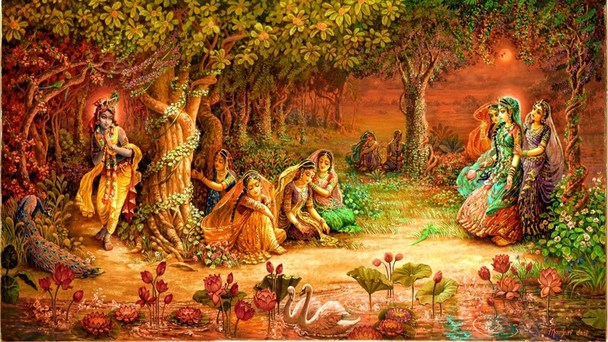 Gopis lamenting when Shri Krishna disappeared from Maharas
Gopis lamenting when Shri Krishna disappeared from Maharas
Chittra jalp is outburst of the suppressed pathos of separation, and also of intense solicitude for the absent lover. There are 10 kinds of Chittra jalp:
1. Prajalp (प्रजल्प)
2. Parijalp (परिजल्प)
3. Vijalp (विजल्प)
4. Ujjalp (उज्जल्प)
5. Sanjalp (सन्जल्प)
6. Abhijalp (अभिजल्प)
7. Avijalp (अविजल्प)
8. Aajalp (आजल्प)
9. Pratijalp (प्रतिजल्प)
10. Sujalp (सुजल्प)
The best idea of all these states of Chittra Jalp can be taken from Shrimad Bhagvat Mahapuran, Gopi Geet in 10th canto. This divine stage of deepest love is also known as Divyonmaad (divine ecstasy).
1. Prajalp (प्रजल्प)
2. Parijalp (परिजल्प)
3. Vijalp (विजल्प)
4. Ujjalp (उज्जल्प)
5. Sanjalp (सन्जल्प)
6. Abhijalp (अभिजल्प)
7. Avijalp (अविजल्प)
8. Aajalp (आजल्प)
9. Pratijalp (प्रतिजल्प)
10. Sujalp (सुजल्प)
The best idea of all these states of Chittra Jalp can be taken from Shrimad Bhagvat Mahapuran, Gopi Geet in 10th canto. This divine stage of deepest love is also known as Divyonmaad (divine ecstasy).
|
Among the two aspects of adhiroorha mahabhava, maadan (मादन) or amatory intoxication is the fullest development of all the sentiments of divine love. Shri Radha alone experiences this bliss.
सर्वभावोद्रगमोल्लासी मादनोऽयं परत्परः ।
राजते ह्लादिनी सारो राधायामेव यः सदा ॥ sarvabhāvodragamollāsī mādano'yaṃ paratparaḥ । rājate hlādinī sāro rādhāyāmeva yaḥ sadā ॥ Even Absolute Brahm Shri Krishna (called par) cannot access this exclusive stage of love. There is nothing beyond this bliss. That is why this state is called Paraatparah (परात्पर), which means it is beyond par (aka Shri Krishna). Upon revelation of Mahabhav, Shri Radha experiences the limitless bliss of all aspects of Beloved Shri Krishna, all at the same time. e.g. the bliss of simultaneously talking to Him, seeing Him, touching Him, kissing Him, embracing Him, smelling His fragrance etc.
Although Shri Radha is established on the highest stage of love, where Shri Krishna also cannot reach, yet she is enraptured by everything of beloved Shyam Sunder. Let alone human being this is beyond comprehension of creator Lord Brahma, Lord Shankar, sage Narad etc. as well. |

